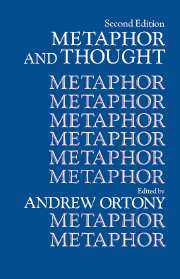Book contents
- Frontmatter
- Contents
- List of contributors
- Preface to the second edition
- Preface to the first edition
- 1 Metaphor, language, and thought
- METAPHOR AND MEANING
- 2 More about metaphor
- 3 Figurative speech and linguistics
- 4 The semantics of metaphor
- 5 Some problems with the notion of literal meanings
- 6 Metaphor
- 7 Language, concepts, and worlds: Three domains of metaphor
- 8 Observations on the pragmatics of metaphor
- METAPHOR AND REPRESENTATION
- METAPHOR AND UNDERSTANDING
- METAPHOR AND SCIENCE
- METAPHOR AND EDUCATION
- References
- Author index
- Subject index
8 - Observations on the pragmatics of metaphor
Published online by Cambridge University Press: 05 June 2012
- Frontmatter
- Contents
- List of contributors
- Preface to the second edition
- Preface to the first edition
- 1 Metaphor, language, and thought
- METAPHOR AND MEANING
- 2 More about metaphor
- 3 Figurative speech and linguistics
- 4 The semantics of metaphor
- 5 Some problems with the notion of literal meanings
- 6 Metaphor
- 7 Language, concepts, and worlds: Three domains of metaphor
- 8 Observations on the pragmatics of metaphor
- METAPHOR AND REPRESENTATION
- METAPHOR AND UNDERSTANDING
- METAPHOR AND SCIENCE
- METAPHOR AND EDUCATION
- References
- Author index
- Subject index
Summary
Introduction
I am persuaded that the main points in Professor Searle's paper are correct, but there are a few arguments which leave me unsatisfied. I agree with his point that metaphor can only be understood by close attention to the distinction between “sentence meaning” and “utterance meaning,” and that metaphor must be considered a case of the latter, not the former. But I find some aspects of his proposal for a proper treatment of metaphor tantalizingly vague or incomplete. In particular, it seems to me that his discussion of “call to mind” casts the net too wide, capturing some things that are not in the same boat as clear cases of metaphor. Moreover, there are some difficult leaps in his three-step analysis of metaphor, and I think that his proposal avoids dealing with an important question about its nature. I have a few other quibbles that I shall mention along the way, though I do not think they are a serious threat to Searle's analysis, with which, as I have said, I generally agree.
The proper domain of the analysis of metaphor
The distinction Searle makes between sentence meaning and utterance meaning is a crucial one, not only for metaphor, but for the study of meaning in general. The mistake of overlooking this distinction has constantly plagued work on meaning by linguists, and I think recognition of the importance of the distinction is a real advance.
Information
- Type
- Chapter
- Information
- Metaphor and Thought , pp. 124 - 134Publisher: Cambridge University PressPrint publication year: 1993
Accessibility standard: Unknown
- 12
- Cited by
